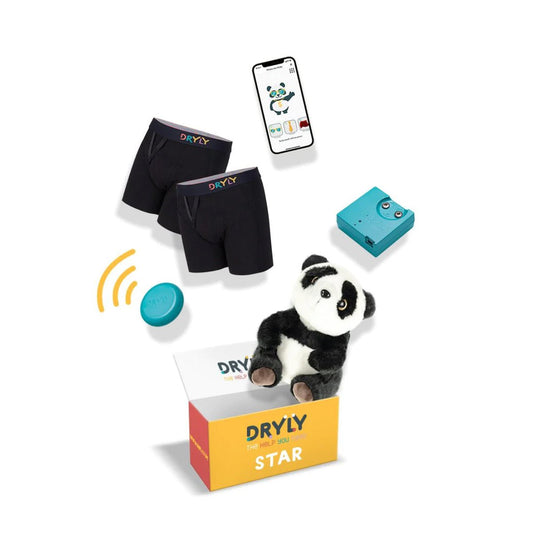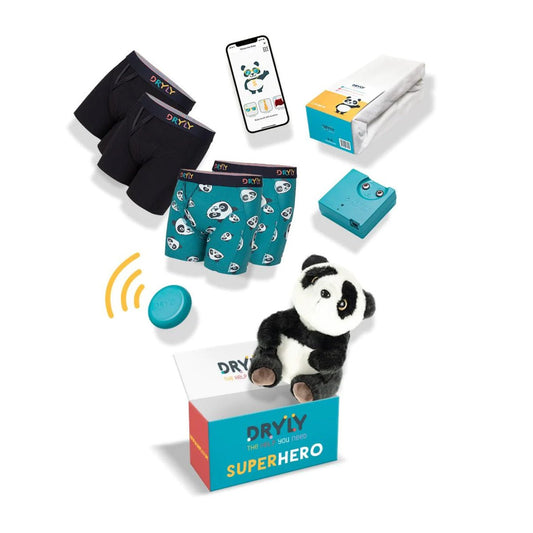Bedwetting: Everything you need to know
What is bedwetting? When a child is of the age when they should have good bladder control but still wets the bed, we call it bedwetting. In practice, this happens to children as young as five and six years old. It occurs in many children and is not as unusual as you might think. About one in six children around six years old suffer from it. Because it is often not talked about much, children (and parents) get into the assumption that they are on their own. We are changing that!
Causes of bedwetting
Specialists do not yet know exactly why one child wets the bed and another does not. Therefore, the causes are not yet completely clear. On average, boys wet the bed twice as often as girls. We know that wetting the bed is a natural part of development in which the body gets to know itself better and better. Little by little, it gains better control of the bladder and the brain learns to recognize messages of a full bladder better.
Because it is hereditary, you see that certain families suffer from it more than others. If both parents have suffered from it in the past, there is a 77% chance that the child will suffer from it too! We give you tips against bedwetting below.
How do you deal with bedwetting?
What to do about bedwetting? It is important to realize that you are not alone! Every day, millions of children suffer from bedwetting. Often children feel guilty and ashamed. It is important that you explain to your child that this happens to many children and that sooner or later it will pass. Explain to your child in a positive way that he or she is not alone.
In many cases, your little one finds it difficult to stay with friends because there is a chance that other children will see it too. This is perfectly normal, and depending on your child, you can decide whether to give it a nudge or leave it at that.
If your child has an accident in the evening, it is important not to get angry or frustrated. In almost all cases, there is not much the child can do about it. You can, however, ask your child to help you change the bed so he or she becomes more aware of the consequences. Make it clear that it is not a punishment, but that it is part of the process!
Solutions to bedwetting
Bedwetting is an unpleasant event. Fortunately, there are several solutions to bedwetting. For example, you can wake your child in time at night. You can also go to the doctor and get informed if there are medications for the problem. Medication is a last resort. Fortunately, there are also kinder and more efficient ways to solve your child's bedwetting problem. The bedwetting method offers relief in most cases.
Scientific research has shown that 93% of all children are potty-trained at night within 6 to 8 weeks when using the Dryly bedwetting alarm. Not for nothing are many parents very positive about the operation of the Dryly® bedwetting alarm. We are therefore enormously proud of the positive reviews!
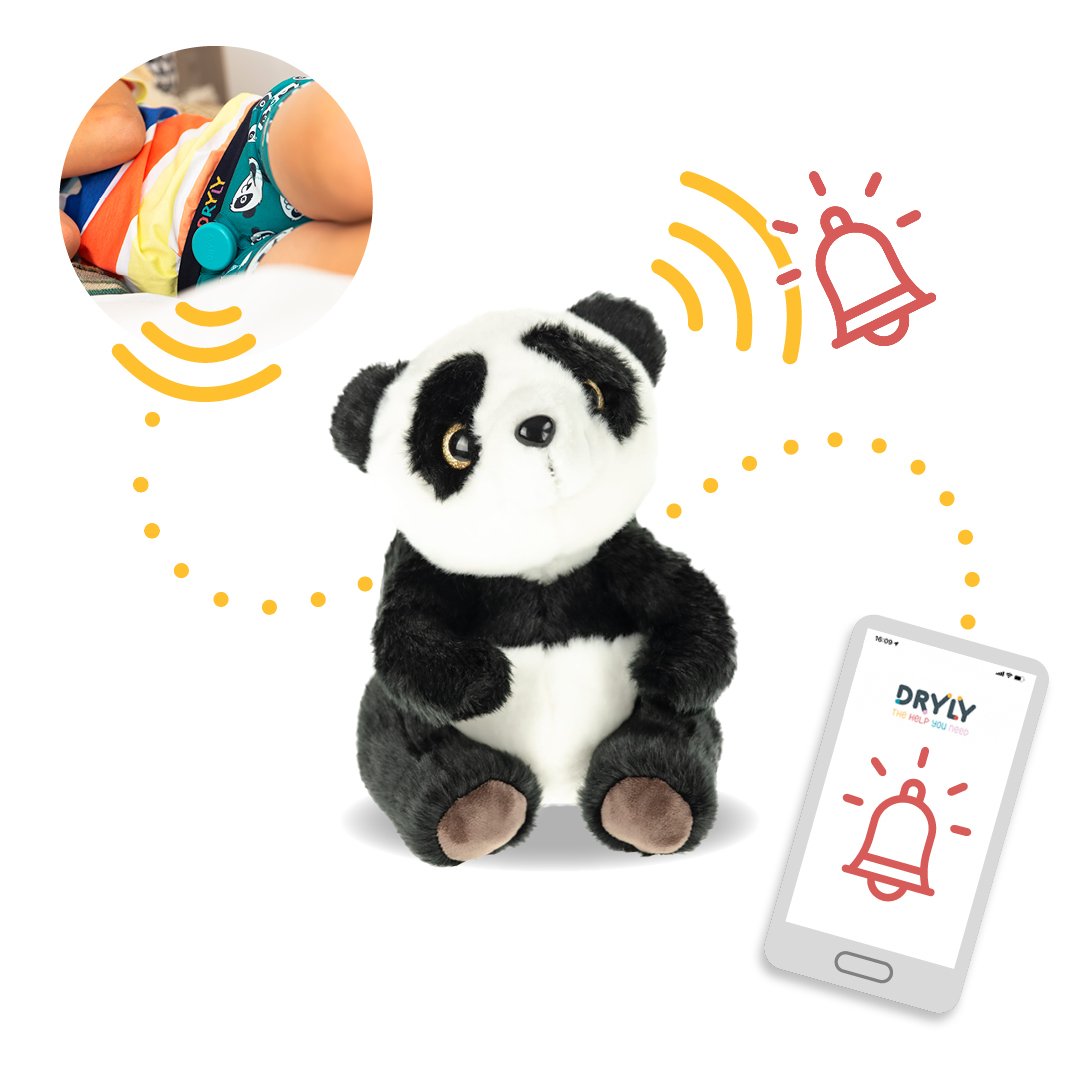
Peeking method
Tackling bedwetting with the Dryly® bedwetting alarm is the most effective and fastest method of helping children get rid of bedwetting. The bedwetting alarm method is a training program that teaches the child to wake up when the bladder signals when it is full. This is done using special sensor underwear which sends a signal to the panda toy Wizzu and to the parents' mobile App when your child needs to go to the toilet.
When your child goes to bed, he/she puts on a special sensor panty and clicks the transmitter on it. As soon as your child begins to urinate in bed at night and the first drops of urine enter the sensor underpants, the alarm of the bedwetting alarm immediately goes off and a signal is sent to the parents' cell phone. Parental support is crucial during this process. The alarming sound from Wizzu (the panda stuffed toy) promptly wakes your child and in a reflex, the sphincter of the bladder will close.
Your child can turn off the alarm clock by shaking Wizzu once and then go to the bathroom.
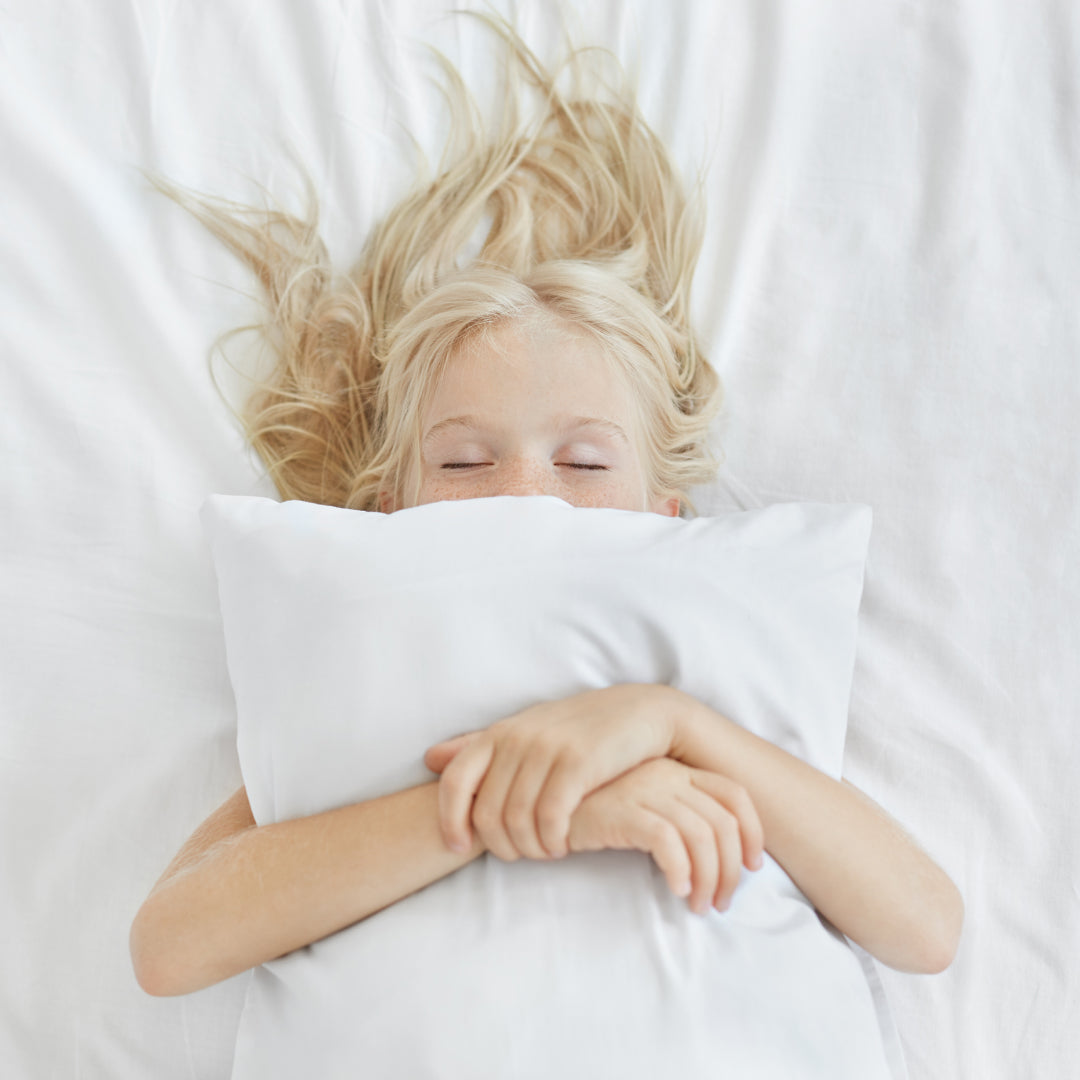
Bedwetting medication
Minrinis the most commonly prescribed bedwetting medication. This bedwetting medication reduces urine production during sleep. Normally, urine production during the night is lower than during the day. This is caused by the hormone ADH. Sometimes in children, the production of ADH at night is not lower than during the day. This causes the amount of urine to not fit into the bladder at night.
When a child reaches the age of 7, bedwettingis considered a problem. There are several solutions to bedwetting. The first choice is the use of a bedwetting alarm; if the bedwetting alarm does not help, your child can be prescribed medication against bedwetting.
-
Dryly® Bedwetting Alarm Star
Normal price 199.99Normal priceUnit Price / per251.00Offer price 199.99- Dryly® mobile app
- No mattress protector
- Underwear plain 2-pack
- Wizzu (panda toy)
- Transmitter & receiver
Sale -
Dryly® Bedwetting Alarm Hero
Normal price 219.99Normal priceUnit Price / per273.00Offer price 219.99- Dryly® mobile app
- No mattress protector
- Underwear plain 3-pack
- Wizzu (panda toy)
- Transmitter & receiver
Sale -
Dryly® Bedwetting Alarm Superhero
Normal price 249.99Normal priceUnit Price / per328.00Offer price 249.99- Dryly® mobile app
- With mattress protector
- Underwear plain 2-pack
- Underwear print 2-pack
- Wizzu (panda toy)
- Transmitter & receiver
Sale
Collapsible content
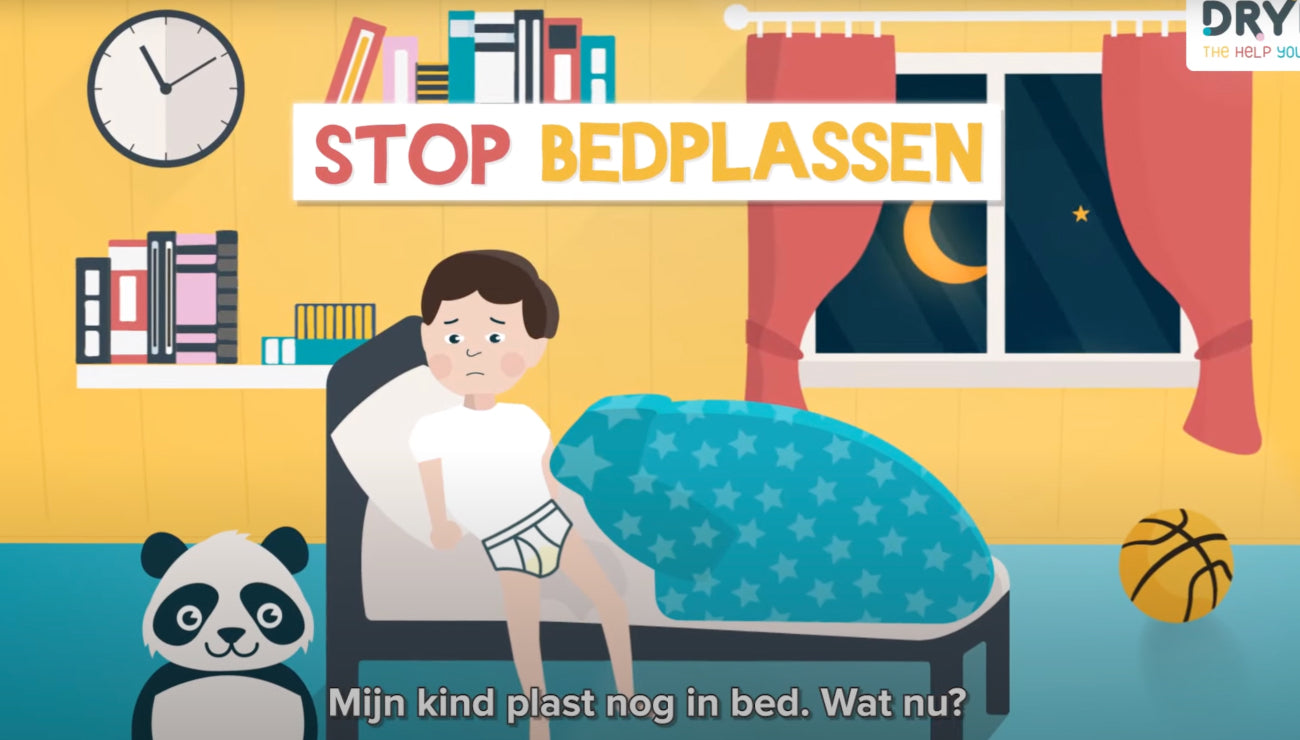
Is bedwetting hereditary?
Heredity always plays an important role in bedwetting. If one of the parents has suffered from bedwetting in the past, there is a 43% chance that the child will also suffer from it. If both parents have suffered from bedwetting in the past, the chances are as high as 77%!
Frequently, parents look for the cause in the child. Arguments like "he/she is lazy and doesn't want to leave the warm bed" or "my child always waits too long" or "my child drinks too late or too much" are used.
However, these are all fairy tales. However, experience shows that children do find bedwetting a problem, but do not always show it. Bedwetting is annoying enough for your child. Provide adequate support and emphasize that it is no big deal if an accident has happened.
Enuresis nocturna
What is enuris nocturna? By looking at the two words in enuresis nocturna separately, a lot already becomes clear! Enuresis is a medical word for letting your pee run involuntarily, and nocturna indicates that something happens at night. By combining these words you have "bedwetting"!
Enuresis Nocturna occurs in lots of children, so you are not alone! Perhaps your family doctor or urotherapist has already provided some guidance. The Nederlands Huisartsen Genootschap has a guideline for enuresis nocturna on their website. We recommend always following this guideline to help your child as effectively as possible!
Bedwetting child
Most children are potty-trained during the day from about 3 or 4 years old. It usually takes a little longer for them to become dry at night as well.
We speak of bedwetting when a child aged 5 years or older wets the bed one or more times a week for an extended period of time. At the age of 6 , this still occurs in about 15% of children. Is your child 7 years old or older and not yet potty-trained at night? Then the bedwetting method is a suitable method to help.
Below you can read more tips against bedwetting for different ages:
- Bedwetting child 3 years old
- Bedwetting child 4 years old
- Bedwetting child 5 years old
- Bedwetting child 6 years old
- Bedwetting child 7 years old
- Bedwetting child 8 years old
- Bedwetting child 9 years old
- Bedwetting child 10 years old
- Bedwetting child 11 years old
- Bedwetting child 12 years old
-
Never knew a dryly bedwetting alarm would be a godsend! An alarm clock in the shape of a soft toy and no one sees that you have a bedwetting alarm in your room. We ordered a package with 4 underpants was cheaper than loose and then unfortunately No reimbursement from the insurance I thought at first, quite an expense but actually you can strip the money away.
-
Fine program! Top system for our son. Only the pants are quite small and too bad that wizzu only has 1 alarm sound. Otherwise a super program.
-
Shipping took a little long, but her product is top notch! Daughter loves it with the toy and the app and is super motivated partly because of it!
-
What a great invention!!! I was suspicious about the bedwetting alarm at first but immediately after 1 week of use we saw progress. Meanwhile both sons are potty trained with Dryly's bedwetting alarm. Huge pluses for the fun method and playful approach!!! Dryly thanks for your invention.
-
Our 7-year-old son wet his bed so much every night that no diaper could stop it. When we saw dryly passing by on Facebook, we were a little skeptical at first. Because we became so despondent about the situation, we decided to purchase a dryly bedwetting alarm anyway.
-
After also sending an email to dryly they called me nicely And walked me through the program the device is now working properly. The telephone support is really perfect this man took all the time.
-
Setting up the dryly was a little tricky at first because it kept not picking up our WiFi network. But after a call to the fine customer service department, the system worked fine after a reset. The app works with a reward system which made us enthusiastic to get started. The first nights we got 2-3 reports of accidents every night.
-
Daughter of 5 was wet every night, therefore chose to order the dryly. The first week she did not wake up despite the vibrate function. The 2nd week this was different and she did wake up from the alarm and vibration function, but in a wet bed. The 3rd week she woke up immediately from the alarm as soon as there was 1 drop in the pants, this made her stop and go to the toilet.
